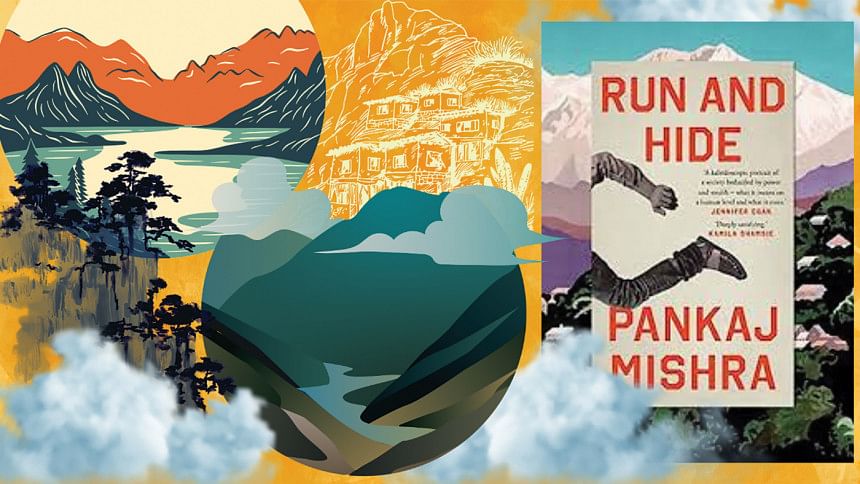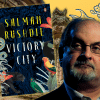Sad men behaving badly

In January 2023, I was sitting in the crowd, listening in on a panel at the 10th and possibly the final edition of the Dhaka Lit Fest. Sheikh Hasina had already been in power for almost 15 years, and it felt like the sun would never set on Awami League, at least not in my lifetime. Inside the Bangla Academy, Booker winner Shehan Karunatilaka was talking about the disillusionment of the presidential coup in Sri Lanka. Also present at the panel was acclaimed essayist and novelist Pankaj Mishra, who is known for his critique of the dark underbelly of India's economic growth and the deeply problematic rise of Hindu nationalism. Where Karunatilaka's focus was on the anarchy that thrived in the power vacuum that appeared immediately after the Aragalaya, Mishra, whose novel Run and Hide (Farrar, Straus and Giroux, 2022) marked his return to fiction after 25 years, opined that systems broken by the legacy of colonialism cannot hope to function normally.
It is through these three characters that Mishra attempts to make his point about how a broken system can only churn out broken individuals who continue to repeat these problematic patterns.
Two months since the July revolution and with the fatigue setting in from the messy process of living in a broken country trying to rebuild itself, it felt like a good enough time to crack open my copy of Run and Hide that had been gathering dust on my TBR.
The story traces the journey of three young men who achieve the holy grail of entry into the prestigious Indian Institute of Technology (IIT), viewed by swathes of the populace as a chance to rewrite their faiths. In the novel's harrowing opening scene, the three are subjected to a horrific and casteist hazing ritual, which binds them in their journey forward. True to the promise of IIT, the three are actually able to shake off their impoverished backgrounds and elevate their stations. Virendra, the Dalit subject of the worst of these rituals, becomes a Wall Street tycoon. Aseem, another of their circle, lands in the media and becomes a celebrity pop-intellectual. Arun, our narrator, initially takes a different path, living in Himalayan village and eking out his living as a translator. While the three are transforming their lives, Modi is voted into power and begins pushing forward his nationalistic agendas while abroad, the US enters its Trump era and the UK inches towards Brexit.
Woven into this narrative are glimpses of Arun's humble past, and these are the parts where the book really shines. Mishra draws a rich, nuanced portrait of poverty, one that manages to retain a range of human emotions and everything he wants to convey about the desperation that marks the journey out of impoverishment–the lack of employment options, the brutish caste discrimination, and so forth—he manages with the kind of subtlety one wishes he maintained in other parts of the book.
The three male leads are never quite able to shake off the psychological scars left by their impoverished beginnings and the casual cruelty and the constant panic of discovery amidst the dog-eat-dog atmosphere of their IIT days because of it. This is evidenced in their empty and blinkered later lives, filled with sexual debauchery and conspicuous consumption, be it Virendra's obsession with expensive prostitutes or Aseem's incessant boasting about his sexual prowess. Initially, it seems like Arun, at least, escapes these temptations through his hermit-like tendencies, but as the novel progresses, which is written as one long confessional missive to an abandoned lover, we learn that Arun's modus operandi has always been to run and hide. He runs from his past into IIT, where he hides his true caste. He runs away from his family responsibilities afterwards, preferring the mindless drudgery of the rat race in Delhi, even when it is clear that his mother and sister need his support. He even hides from the temptation of success by running off with his mother to the Himalayas, and then runs away when she becomes gravely ill. When he begins his ill-timed affair with Alia, the old money liberal activist, he hides his true self from her and her glittery set, roleplaying his way through life before eventually abandoning her as well.
It is through these three characters that Mishra attempts to make his point about how a broken system can only churn out broken individuals who continue to repeat these problematic patterns. I say 'attempts' because the rest of the novel fails to live up to the glimmers of a few chapters.
Critics of the novel have pointed out how the characters are poorly written to the point of being cartoonish. Whether we're reading about the hypocrisy of Aseem bloviating in public about violence in Kashmir, or the mistreatment of the Dalit community but rubbing shoulders with the "villains" in his narratives, or Arun's abusive father who in his later days becomes one of those Facebook trolls, or even Alia's glittering set soapboxing about the world's inequalities at their fancy parties—there is little to no nuance in any of the characters. Others have pointed out the large chunks of exposition where Pankaj Mishra the novelist takes a backseat to Pankaj Mishra the social commentator, to the detriment of the integrity of the novel as a work of fiction (sorry, Mister Mishra, but Sally Rooney did it better). These are all very legitimate observations, but if I had to pick my personal peeve about the novel, it is this: the tired old trope of sad men behaving badly has long outstayed its welcome. There has to be more to the Künstlerroman than some flawed character that refuses to evolve, but must somehow be pitied.
Pankaj Mishra has famously been critical of what he calls Salman Rushdie's 'selective humanism', but in Run and Hide, at least, he fails to deliver something that rises above the most superficial criticism of the systems that maintain these inequalities. If you're looking for an epistolary novel that does the subversion of the class and caste systems in a more satisfying way, Arvind Adiga's White Tiger (Free Press, 2008) is still the one to beat.
Sabrina Fatma Ahmad is a writer, journalist, and the founder of Sehri Tales.

 For all latest news, follow The Daily Star's Google News channel.
For all latest news, follow The Daily Star's Google News channel. 







Comments